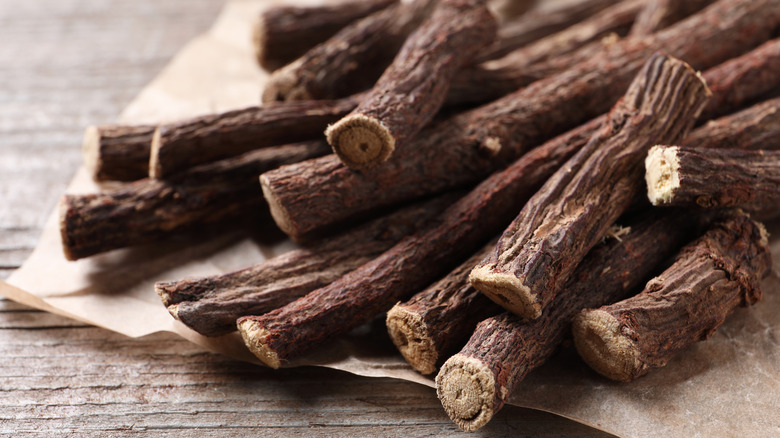Can Adding Licorice To Your Diet Help Relieve Heartburn?
If you've ever experienced heartburn, you're well aware of the awful sensation it causes in your chest — almost as if your esophagus is on fire. Despite its name, heartburn doesn't have anything to do with the heart muscle, although it does take place in the same region, behind the breast bone, as per the Cleveland Clinic. During a bout of heartburn, you'll likely feel a burning sensation that can be accompanied by an acidic taste rising up your throat. You may also find it challenging to swallow as normal and can even feel a sharp pain if you bend over or keep yourself in a prone position.
Heartburn is a result of stomach acid — which is necessary for digesting food — moving up out of the stomach and into the tube that transports food from our mouth to our stomach: the esophagus (via Cedars-Sinai). Although the base of the esophagus features a sphincter, known as the lower esophageal sphincter (LES), which is designed to stay closed as long as food isn't actively entering the stomach, it can become faulty and cease to leave stomach acid where it belongs. If you lie down after eating, the position also makes it more likely for this to occur.
Luckily, heartburn can be alleviated with some over-the-counter medications, including antacids, like Tums, and histamine-2 (H2) blockers, such as Pepcid, according to the U.S. Food & Drug Association (FDA). You can also opt for a number of at-home remedies, such as licorice, adds Healthline.
Licorice can protect your esophagus from stomach acid
Among the various at-home remedies for finding relief from heartburn is licorice root, which has been used in both traditional and modern medicine for its medicinal effects, as per Healthline. It has also been used to treat peptic ulcers, which are open wounds in the stomach and upper intestine caused by bacteria and some anti-inflammatory medications, explains the Mayo Clinic. In fact, scientists have examined the plant for its ability to amp up mucous production in the body, especially in the stomach and esophagus.
In one 2013 study published in the Journal of Research in Medical Sciences (JRMS), researchers used licorice extract as part of a treatment regimen for peptic ulcers and found that it significantly healed the sores in the group who took it. They concluded that not only does licorice increase mucous production, but it also actively covers the ulcer, which provides a protective layer.
A 2020 review of the healing properties of licorice root published in the Textbook of Natural Medicine also sang the plant's praises for addressing issues in the upper digestive tract. Researchers pointed out that licorice plays an important role in protecting these areas from damage caused by stomach acid by increasing the amount of blood that reaches the mucosa, such as the inner lining of the esophagus. It can also heal injuries caused to these mucous membranes by stomach acid, potentially reducing the burning sensation you feel when you have heartburn.


